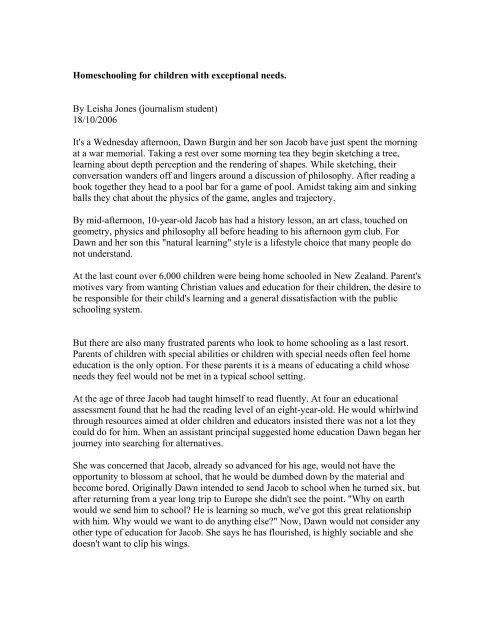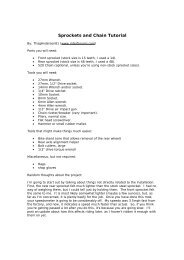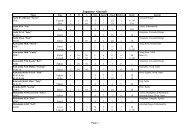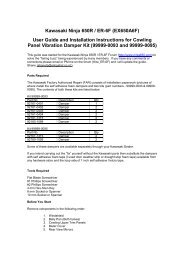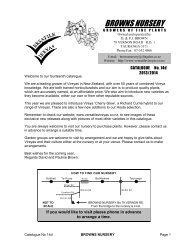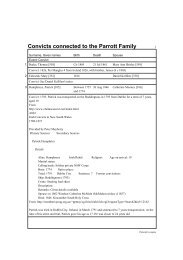Homeschooling for children with exceptional needs. By ... - Slingshot
Homeschooling for children with exceptional needs. By ... - Slingshot
Homeschooling for children with exceptional needs. By ... - Slingshot
You also want an ePaper? Increase the reach of your titles
YUMPU automatically turns print PDFs into web optimized ePapers that Google loves.
<strong>Homeschooling</strong> <strong>for</strong> <strong>children</strong> <strong>with</strong> <strong>exceptional</strong> <strong>needs</strong>.<br />
<strong>By</strong> Leisha Jones (journalism student)<br />
18/10/2006<br />
It's a Wednesday afternoon, Dawn Burgin and her son Jacob have just spent the morning<br />
at a war memorial. Taking a rest over some morning tea they begin sketching a tree,<br />
learning about depth perception and the rendering of shapes. While sketching, their<br />
conversation wanders off and lingers around a discussion of philosophy. After reading a<br />
book together they head to a pool bar <strong>for</strong> a game of pool. Amidst taking aim and sinking<br />
balls they chat about the physics of the game, angles and trajectory.<br />
<strong>By</strong> mid-afternoon, 10-year-old Jacob has had a history lesson, an art class, touched on<br />
geometry, physics and philosophy all be<strong>for</strong>e heading to his afternoon gym club. For<br />
Dawn and her son this "natural learning" style is a lifestyle choice that many people do<br />
not understand.<br />
At the last count over 6,000 <strong>children</strong> were being home schooled in New Zealand. Parent's<br />
motives vary from wanting Christian values and education <strong>for</strong> their <strong>children</strong>, the desire to<br />
be responsible <strong>for</strong> their child's learning and a general dissatisfaction <strong>with</strong> the public<br />
schooling system.<br />
But there are also many frustrated parents who look to home schooling as a last resort.<br />
Parents of <strong>children</strong> <strong>with</strong> special abilities or <strong>children</strong> <strong>with</strong> special <strong>needs</strong> often feel home<br />
education is the only option. For these parents it is a means of educating a child whose<br />
<strong>needs</strong> they feel would not be met in a typical school setting.<br />
At the age of three Jacob had taught himself to read fluently. At four an educational<br />
assessment found that he had the reading level of an eight-year-old. He would whirlwind<br />
through resources aimed at older <strong>children</strong> and educators insisted there was not a lot they<br />
could do <strong>for</strong> him. When an assistant principal suggested home education Dawn began her<br />
journey into searching <strong>for</strong> alternatives.<br />
She was concerned that Jacob, already so advanced <strong>for</strong> his age, would not have the<br />
opportunity to blossom at school, that he would be dumbed down by the material and<br />
become bored. Originally Dawn intended to send Jacob to school when he turned six, but<br />
after returning from a year long trip to Europe she didn't see the point. "Why on earth<br />
would we send him to school? He is learning so much, we've got this great relationship<br />
<strong>with</strong> him. Why would we want to do anything else?" Now, Dawn would not consider any<br />
other type of education <strong>for</strong> Jacob. She says he has flourished, is highly sociable and she<br />
doesn't want to clip his wings.
When a child is between the ages of 6 - 16 parents must request an application <strong>for</strong><br />
exemption from the Ministry of Education. In this application parents must point out how<br />
they intend to educate their child "at least as well and as regularly as in a registered<br />
school." There is no set curriculum <strong>with</strong> home education and parents can choose which<br />
ever method suits them and their child best.<br />
Dawn labels herself an "unschooler", a natural learning style that circles around everyday<br />
life experiences. Formal lessons and class times have no relevance and the child can<br />
define what they want to learn by following their specific interests. John Holt, the<br />
founder of unschooling, says there is no difference between living and learning, "that<br />
living is learning, that it is impossible and misleading and harmful to think of them as<br />
separate." It is compounding the learning into everyday life. Because "life is not divided<br />
into subjects," Dawn explains.<br />
Stephen Thoms, president of the New Zealand association <strong>for</strong> gifted <strong>children</strong>, says a<br />
number of <strong>children</strong> <strong>with</strong> special abilities are being home schooled and often it is a last<br />
resort. He says a lot of gifted <strong>children</strong> start out in schools be<strong>for</strong>e parents realise the<br />
schools are not capable and home educating is a better option.<br />
"More parents are doing it because the education system is incompetent. Education in<br />
New Zealand is so P.C, so rigid and inflexible to a child's <strong>needs</strong> that if you can't af<strong>for</strong>d<br />
boutique education the only escape is home schooling."<br />
At the opposite end of the spectrum, <strong>children</strong> <strong>with</strong> learning disabilities are also<br />
having trouble in the schooling system and Jeremy Drummond, vice president of SPELD<br />
believes home education is a valid option. It is a serious alternative <strong>for</strong> families who are<br />
desperate, because in mainstream education their child's <strong>needs</strong> are often overlooked or<br />
not adequately addressed.<br />
When learning disabilities are not picked up a child can become riddled <strong>with</strong> a glut of<br />
other problems. Behavioral and self esteem issues pop up, which Mr Drummond says are<br />
all strategies to avoid doing work. "Their self esteem is hindered by constantly comparing<br />
themselves to other <strong>children</strong>. It's very hard <strong>for</strong> them in the mainstream, it makes them feel<br />
dumb. The other kids make them feel dumb, when often they just learn differently." The<br />
one-on-one attention that homeschooling offers can help to remediate their problems but<br />
Mr Drummond doesn't think it's a must.<br />
"They miss out on positive social activities and other learning options like P.E, drama<br />
and music. But in certain areas it is not enough and parents in desperation will try to find<br />
an alternative."<br />
Briar Mills, one such desperate parent, has been home schooling 14-year-old Oliver <strong>for</strong><br />
over a year. At six, Oliver was diagnosed <strong>with</strong> auditory processing problems. Mrs Mills<br />
sent him to a number of specialists to help him through school. Despite her perseverance<br />
things did not look up. Recently, he was re-assessed and diagnosed <strong>with</strong> dyslexia and<br />
mild ADD.
When he was kept back a year Mrs Mills could see that if he went back to school he was<br />
not going to cope. "He would be sitting at the back of the classroom filling out only two<br />
words of a worksheet and feeling worse and worse about himself." After 14 months of<br />
home schooling "he's going like a train".<br />
The Mills family works <strong>with</strong> the A.C.E home schooling system, a more <strong>for</strong>mal method<br />
where Oliver does his lessons at a set time each day and has a test at the end of every<br />
unit. The boy who had been underachieving at school is averaging 97% in these tests.<br />
Oliver doesn't miss school because he's working at his own pace and is just happy to be<br />
achieving. "His attitude to learning has changed dramatically and he is so much more<br />
confident," says Mrs Mills.<br />
Home education can be beneficial to the <strong>needs</strong> of a child who learns at a faster or<br />
slower pace. But there are wider aspects of school life they are missing that could<br />
potentially affect their development. "Socialisation" is the most frequent and vehement<br />
criticism of home schooling.<br />
Dawn worries there is a misconception that, "our kids are kept at home chained to a desk.<br />
For a lot of us that's just not the case. These kids aren't kept in bubbles. They have plenty<br />
of opportunities to interact <strong>with</strong> 'normal socialized’ <strong>children</strong>".<br />
The public view is that if a child does not attend school they will not learn to<br />
communicate amongst their peers or how to react in different social situations. But most<br />
home educators believe the social ramifications of home schooling on their <strong>children</strong> have<br />
been nothing but advantageous.<br />
The Ministry of Education says parents are asked to clarify how they intend to provide<br />
social contact <strong>with</strong> other <strong>children</strong>. They will often describe a wide range of activities to<br />
suit the child's <strong>needs</strong>. If there was ever any concern that these <strong>needs</strong> were not being met,<br />
they would ask <strong>for</strong> further in<strong>for</strong>mation.<br />
Heather Keys recalls her eldest son's response when she decided to home school her<br />
youngest boy. He reacted <strong>with</strong> concern, saying she would turn him into a "weirdo" and a<br />
"wild rat". After five years of home schooling she says there was no better option <strong>for</strong><br />
Jono, who is capable beyond his years and did not fit in at school. She describes his<br />
amazing self confidence and ability to think outside the square as a result of home<br />
education.<br />
Ms Keys takes a "relaxed" or "eclectic" approach to home schooling. This style uses a<br />
little of this and a little of that, using <strong>for</strong>mal text books <strong>for</strong> some subjects and taking an<br />
unschooling approach <strong>with</strong> others.<br />
She takes a holistic approach towards her sons learning, going out of her way to arrange<br />
learning experiences <strong>for</strong> other home schooled <strong>children</strong> and provide bountiful social
opportunities <strong>for</strong> Jono. She organises music classes, a choir, art class, science fairs, surf<br />
life saving, Christmas plays and countless field trips. Her photo albums are full of spirited<br />
<strong>children</strong> gaining practical, hands-on experience and enjoying learning in the world that is<br />
their classroom.<br />
Many home educators are frustrated by the public attitude towards their lifestyle and say<br />
people don't realise there are support groups throughout the country that provide social<br />
opportunities <strong>for</strong> home schooling families.<br />
Through these groups parents exchange in<strong>for</strong>mation and <strong>children</strong> <strong>for</strong>m friendships. Dawn<br />
reveals one of the truly remarkable things about home schooling and the thing she loves<br />
the most is the way the <strong>children</strong> interact <strong>with</strong> one another on these occasions.<br />
She says they accept each another <strong>with</strong> no regard <strong>for</strong> the age and gender boundaries that<br />
usually go up between <strong>children</strong>. The older kids nurture and respect the younger ones, "It's<br />
a beautiful thing to see", says Dawn.<br />
Irene Cooper, national president of the New Zealand Educational Institute and a<br />
primary school principal, says home education is a choice that all parents are entitled to,<br />
but believes our public schools provide a good service.<br />
However, parents of gifted <strong>children</strong> or those <strong>with</strong> learning difficulties have a view that<br />
the ability of schools to meet a diversity of <strong>needs</strong> is not up to standard.<br />
Mrs Cooper explains home schooling is a different kind of education and is very hard to<br />
define. But she believes home schooled <strong>children</strong> are missing out on a kind of learning<br />
they cannot gain elsewhere. "In primary school <strong>children</strong> are in a class <strong>with</strong> the same<br />
classmates all day. They are together all year and they establish relationships. Then there<br />
is an even broader mix in the playground. They learn ways to behave and operate in<br />
conventional society. It's good learning <strong>for</strong> life and learning to become a good citizen of<br />
this country. What home schoolers do to establish this, I don't know."<br />
She says schools in New Zealand are required to provide extra care <strong>for</strong> <strong>children</strong> <strong>with</strong><br />
<strong>exceptional</strong> <strong>needs</strong> and in her view it is something they deliver on. But the flexibility and<br />
freedom that home education provides means a child's strengths and weaknesses can be<br />
individually nurtured. Many home educators feel this would never be possible in a<br />
conventional school environment.<br />
Ms Keys says she wouldn't recommend home education to everyone, but if you're not<br />
happy <strong>with</strong> school and if you're prepared to give it the time and energy, it is a fantastic<br />
opportunity. "If you have got a kid that is not Joe Average, a kid that <strong>needs</strong> extra help or<br />
a kid that is extra bright, get them assessed by an educational psychologist. Find out what<br />
their weaknesses are and what their strengths are. Don't just fluff around.<br />
"You've got to train them up <strong>for</strong> the rest of their life. You can't just look at this little holy<br />
huddle that is going to happen now. These kids have got a future, they've got to go into
the work<strong>for</strong>ce, go into tertiary education of some kind. They've got to interact <strong>with</strong><br />
people who are high flying managers, CEO's or just get on <strong>with</strong> Jo Bloggs down at the<br />
workshop.<br />
"They've got to be able to communicate and mix in. If you don't teach them that, if you<br />
offer them this little 'me, myself and I' thing and don't pursue what's best <strong>for</strong> the kid, I<br />
don't think you should do it."<br />
Reprinted <strong>with</strong> permission.


